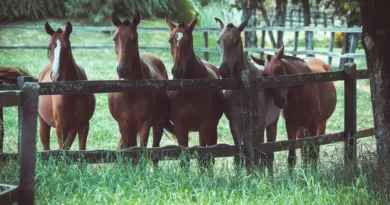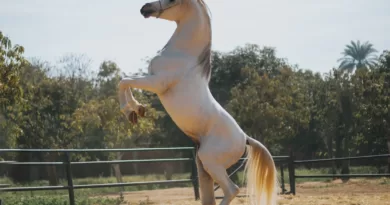How Long Can a Horse Live with COPD?
When it comes to our equine companions, their health and well-being are of utmost importance. COPD (Chronic Obstructive Pulmonary Disease), often referred to as “heaves” in horses, is a prevalent respiratory condition that can impact their longevity and quality of life. In this comprehensive guide, we’ll explore how long a horse can live with COPD, the causes, symptoms, treatment options, and much more.
Understanding COPD in Horses
COPD is a chronic respiratory condition that primarily affects a horse’s airways and lung function. It’s often linked to exposure to dusty or moldy environments, making it a common ailment among stabled horses. The condition leads to inflammation of the airways and excessive mucus production, resulting in labored breathing.
Factors Affecting a Horse’s Lifespan with COPD
The longevity of a horse living with COPD depends on various factors:
1. Early Detection
Early diagnosis and intervention play a pivotal role in a horse’s prognosis. Horses with COPD can lead long and fulfilling lives if the condition is identified and addressed promptly.
2. Management
Proper management of a horse’s environment is crucial. Reducing exposure to dusty or moldy hay, improving ventilation, and maintaining a clean stable can help in managing COPD effectively.
3. Treatment
The availability and success of treatment options also impact a horse’s lifespan. We will delve deeper into treatment options in the next section.
Common Symptoms of COPD in Horses
Recognizing the symptoms of COPD is essential for early intervention. Some common signs include:
- Coughing: Horses with COPD often have a persistent cough.
- Nasal Discharge: Excessive nasal discharge can be a sign of respiratory distress.
- Labored Breathing: Audible breathing efforts or flared nostrils are indicative of breathing difficulties.
- Exercise Intolerance: Affected horses may tire quickly during physical activity.
Diagnosing COPD in Horses
Diagnosing COPD involves a combination of clinical signs and diagnostic tests, such as physical examinations and lung function tests. Moreover, a veterinarian will thoroughly evaluate the horse’s symptoms, medical history, and perform a comprehensive examination to confirm the diagnosis.
Treatment Options for COPD in Horses
There are several treatment options for COPD in horses, depending on the severity of the condition. These include:
1. Medications
- Bronchodilators: These medications help dilate the airways, making it easier for the horse to breathe.
- Corticosteroids: Anti-inflammatory drugs can reduce airway inflammation.
2. Environmental Management
Improving the horse’s living conditions is crucial. Implement these changes to reduce COPD symptoms:
- High-Quality Forage: Provide clean, dust-free hay.
- Well-Ventilated Stables: Ensure proper ventilation in the horse’s living space.
- Reduce Dust: Minimize dust exposure by using dust-free bedding.
3. Nutritional Support
A well-balanced diet can aid in maintaining the horse’s overall health. Consult with a veterinarian to ensure the diet supports the horse’s specific needs.
Preventing and Managing COPD
Prevention is always preferable to treatment. Here are some measures to reduce the risk of COPD in horses:
- Clean Environment: Keep the horse’s living area clean and well-ventilated.
- Low-Dust Hay: Opt for high-quality hay with minimal dust.
- Regular Exercise: Encourage regular, moderate exercise to maintain respiratory health.
FAQs About Horses and COPD
Q1: Can a horse with COPD live a normal life?
A horse with COPD can indeed lead a relatively normal life with proper management and treatment. Furthermore, early diagnosis and timely intervention are key to ensuring their well-being.
Q2: How long can a horse live with COPD?
The lifespan of a horse with COPD varies depending on the severity of the condition and the effectiveness of management and treatment. Some horses with well-managed COPD can live for many years, while others may have a shorter lifespan if the condition is severe and not adequately addressed.
Q3: Is COPD in horses preventable?
While it may not always be preventable, you can reduce the risk of COPD by maintaining a clean and dust-free environment, providing high-quality hay, and ensuring regular exercise.
Q4: Can a horse fully recover from COPD?
Complete recovery from COPD is rare, but with the right treatment and management, many horses can experience significant improvement in their respiratory function.
Q5: What should I do if I suspect my horse has COPD?
If you suspect your horse has COPD, it’s crucial to consult with a veterinarian for a proper diagnosis and treatment plan.
Coping with COPD in Horses: A Lifelong Journey
COPD in horses is a chronic condition, and while it may not be curable, it is manageable. Understanding the nuances of living with a horse diagnosed with COPD is essential for both horse owners and caretakers. Let’s delve deeper into how you can make life as comfortable as possible for your equine friend.
Lifestyle Adjustments
- Stress Reduction: Stress can exacerbate COPD symptoms. Ensure your horse enjoys a peaceful and stress-free environment. Avoid overcrowding, and consider individual turnout for affected horses.
- Dietary Management: Proper nutrition plays a significant role in managing COPD. Consult with a veterinarian or equine nutritionist to develop a suitable diet plan. High-quality forage and limited grain intake are often recommended.
- Regular Exercise: While it’s important to avoid strenuous exercise, keeping your horse active is beneficial. Light exercise, such as turnout in a pasture, can help maintain lung health and overall well-being.
- Medication Compliance: If your horse is prescribed medication, ensure you administer it as directed. Consistency is key to managing symptoms effectively.
Monitoring and Regular Vet Checkups
- Symptom Monitoring: Keep a close eye on your horse’s condition. If you notice any worsening of symptoms, such as increased coughing or labored breathing, consult your vet promptly.
- Vaccinations and Deworming: Stay current with routine veterinary care, including vaccinations and deworming. These preventive measures can help reduce the risk of respiratory infections.
Supportive Care
- Stable Environment: Maintain a clean, dust-free stable. Use low-dust bedding and ensure proper ventilation to minimize environmental triggers.
- Respiratory Supplements: Some supplements can support respiratory health. Discuss with your veterinarian if supplements like omega-3 fatty acids or antioxidants could benefit your horse.
See Also: How long do horses live? Amazing Facts About Horses’ Life
End-of-Life Considerations
It’s essential to acknowledge that COPD is a progressive condition, and as your horse ages, you may need to consider end-of-life decisions. This can be an emotionally challenging time, but ensuring your horse’s comfort and well-being remains a top priority.
Coping with the Emotional Aspect
Caring for a horse with COPD can be emotionally taxing. Don’t hesitate to seek support from equine professionals, support groups, or even equine therapists who can guide you through the emotional aspects of dealing with a chronic condition.
The Long and Happy Journey with Your Horse
In the long and happy journey of caring for a horse with COPD, one can find profound companionship and joy. As you navigate the challenges of this condition, here are some additional insights to make this journey as fulfilling as possible.
Building a Strong Bond
Your relationship with your horse is a remarkable partnership. COPD may present challenges, but it can also deepen the bond between you and your equine friend. Spend quality time together, engage in grooming sessions, and create a positive and loving environment.
Environmental Optimization
- Pasture Time: Whenever possible, allow your horse to graze in a pasture. This natural environment can do wonders for their respiratory health.
- Dust Control: Implement measures to reduce dust in the stable further. This includes dampening hay, using low-dust bedding, and installing air purifiers.
- Weather Considerations: Be mindful of weather conditions. Extremely cold or hot weather can exacerbate COPD symptoms. Provide adequate shelter and protection from extreme elements.
Continuing Education
Stay informed about COPD and, furthermore, the latest advancements in equine health. Attend seminars, read books and articles, and consult with experienced horse owners. Additionally, the more you know, the better equipped you’ll be to provide top-notch care.
Supportive Community
Engage with the horse-loving community, both online and offline. Join forums, social media groups, and local horse clubs. Sharing experiences and learning from others can be incredibly valuable.
Palliative Care
As your horse’s COPD progresses, subsequently, palliative care may become necessary. Your veterinarian can guide you, furthermore, in making compassionate and informed decisions about pain management and end-of-life care.
Never Underestimate the Healing Power of Love
While COPD in horses is a chronic condition, the love, care, and dedication you provide can significantly enhance your horse’s quality of life. Be patient, be vigilant, and always remember that you are your horse’s most cherished companion.
Your Horse’s Well-Being Comes First
In closing, your horse’s well-being is of utmost importance. COPD is a challenge, but it is not an insurmountable one. With love, care, and the guidance of veterinary professionals, you can provide your equine friend with a fulfilling and happy life.
If you have any more questions or need further information about this topic, feel free to reach out. Your horse’s health and well-being are paramount!
Enjoyed this article? You May Also Like:
- Learn in 5 minutes about Cryotherapy for Horses
- Penicillin in Horses; Impeccable Guide in 10 minutes
- Excede Antibiotic For Horses, Fantastic Facts in 5 minutes
- The Science of Oxytocin in Horses: How This Hormone Influences Equine Behavior
- Can Horses Swim? Everything You Need To Know About Horse Swimming






